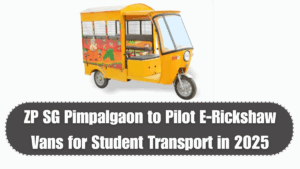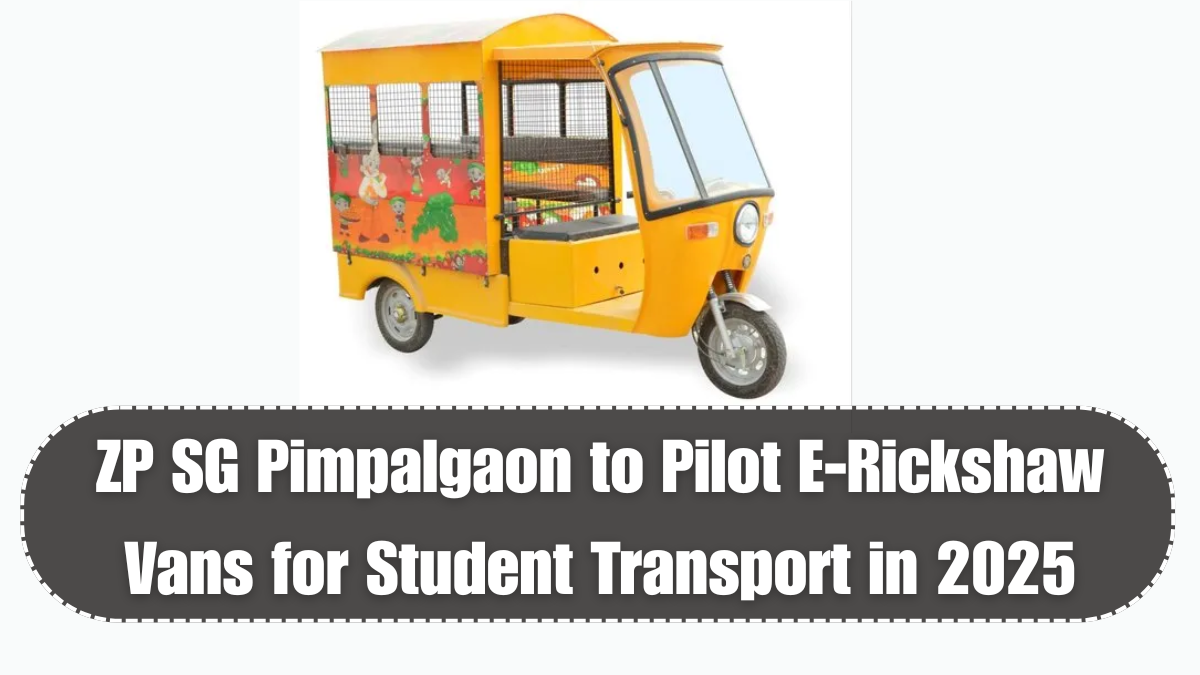The e-rickshaw school van push initiated by ZP School SG Pimpalgaon in 2025 represents a forward-thinking shift in rural student transportation. As part of a pilot scheme to introduce clean and sustainable mobility options, the school is transitioning from traditional diesel vans to electric rickshaws for ferrying students to and from school. This move aligns with India’s green mobility vision while addressing the specific transportation needs of rural communities.
Fuel-driven vans, though common in rural India, come with challenges like high running costs, frequent breakdowns, and harmful emissions. Recognizing these issues, ZP Pimpalgaon is leading by example and opting for school e-rickshaw solutions that are cost-effective, eco-friendly, and easier to maintain. The pilot rollout begins with a small fleet of e-rickshaws operating on popular school routes within a 5–6 km radius.

Benefits of E-Rickshaws in Rural Student Mobility
The primary motivation behind the e-rickshaw school van push is to enhance student mobility in a manner that is both safe and sustainable. E-rickshaws produce zero tailpipe emissions, making them ideal for reducing local air pollution. This is especially crucial for young children who travel daily and are sensitive to poor air quality caused by diesel fumes.
Additionally, electric rickshaws offer:
-
Lower operational and maintenance costs
-
Noise-free travel experience
-
Comfortable seating for short distances
-
Safer driving speeds for school routes
-
Easy maneuverability on narrow rural roads
These advantages make rural EV adoption practical and student-friendly. The school has partnered with local EV vendors to customize e-rickshaws with added safety features like seat belts, side guards, and GPS tracking.
A Sustainable Alternative to Diesel School Vans
The traditional diesel eco van used in schools often lacks proper upkeep and contributes significantly to local carbon emissions. By shifting toward electric rickshaws, ZP SG Pimpalgaon is aligning its school operations with broader environmental goals. E-rickshaws are easier to maintain and do not require fuel refills, which means savings for the school and local operators.
Moreover, the initial data from the pilot has been encouraging—e-rickshaw drivers report reduced maintenance downtime and better fuel efficiency (in terms of charging cost per kilometer). These early results validate the decision to expand the e-rickshaw school van push and extend it to more routes in the upcoming months.
Encouraging Community Involvement and Ownership
The school’s leadership understands that change can only succeed with local support. Therefore, the e-rickshaw school van push also includes awareness drives for parents and local transport providers. Sessions have been conducted on EV safety, charging practices, and financial benefits of switching to school e-rickshaw operations.
As part of the pilot, a few local drivers have received subsidies and low-interest loans to purchase e-rickshaws for school use. This ensures community ownership while building a foundation for long-term rural EV adoption. The initiative has also opened up new employment opportunities for drivers and EV mechanics in the region.
A Scalable Model for Clean Rural Transport
The ZP Pimpalgaon e-rickshaw school van push is already gaining attention from other rural schools and educational officials. If the pilot continues to deliver positive results, this model could be scaled to benefit thousands of rural students across India. The plan is not only good for the environment—it’s practical, efficient, and economically viable.
With strong community involvement and visible improvements in student transportation, this pilot represents a real transformation. The school’s efforts in promoting eco van solutions stand as a shining example of what rural innovation can achieve when guided by sustainability and student welfare.
FAQs
What is the e-rickshaw school van push at ZP SG Pimpalgaon?
It is a pilot program replacing diesel vans with electric rickshaws for student transport, aiming for clean, safe, and cost-effective mobility.
Why are e-rickshaws better for student mobility?
They produce no emissions, have lower maintenance costs, operate at safer speeds, and are ideal for short rural routes.
How is the school ensuring student safety in e-rickshaws?
E-rickshaws are equipped with seat belts, GPS trackers, safety bars, and are operated by verified drivers trained in child safety.
Are local drivers involved in this initiative?
Yes, the school has engaged local drivers and helped some receive loans or subsidies to switch to e-rickshaw operations.
Will this rural EV model be expanded in the future?
If the pilot remains successful, the initiative will be scaled to other schools and villages as a model for clean and safe rural transport.
